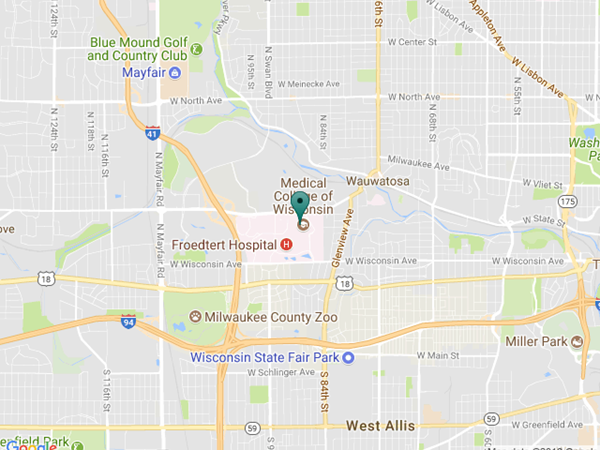Cell & Developmental Biology (PhD) Program at the Medical College of Wisconsin

Message From the Director
 Michaela Patterson, PhD
Michaela Patterson, PhD
Associate Professor of Cell Biology, Neurobiology, and Anatomy
Director, Graduate Program in Cell & Developmental Biology
mpatterson@mcw.edu
(414) 955-4289
The Graduate Program in Cell & Developmental Biology provides outstanding doctoral level training in research to understand the fundamental unit of life, the cell. Research groups in CDB study diverse aspects of cellular science including regulation of cellular differentiation, the molecular basis of regeneration, how neurons sense their environment, the intricacies of signal transduction, and the mechanisms of disease pathology. The Faculty of CDB are committed to excellence in research, education, and career development. We are very proud of our students, post-doctoral fellows, and staff who provide the foundation of a very strong scholarly culture. Please consider joining us – it is such an exciting time to be a cell biologist!
Cell and Developmental Biology
About the Program
The Graduate Program in Cell and Developmental Biology (PDF) provides doctoral research training in cell and developmental biology and the neurosciences. Students are prepared through formal coursework, independent readings, seminars, journal clubs and faculty-supervised research for careers of scientific research in academia and industry.
Our current research strengths are in cellular and molecular mechanisms in developmental biology and neurobiology which employ genetic approaches offered by mice, zebrafish and stem cells. The developmental biology focus is on differentiation and specification in heart, liver, muscle and the nervous system. The neuroscience strengths include pain mechanisms, circadian rhythms, mitochondrial gene expression, color vision, sleep, muscle atrophy, and neuronal development and plasticity.
Our departmental and institutional facilities offer state-of-the art equipment for molecular-to-organism approaches to research problems and hands-on experience with modern cutting-edge technology, including automated protein and DNA sequencing. An imaging core and an electron microscopy service facility offer laser confocal microscopy and high resolution transmission imaging. The College supports medical imaging facilities equipped for scanning brain function (fMRI).
Current Students
Find out more about the Cell Biology, Neurobiology and Anatomy students.
Curriculum
Admissions
Those interested in pursuing education and research within the Department of Cell Biology, Neurobiology and Anatomy should pursue admission through either the Interdisciplinary Program in Biomedical Sciences (IDP) and/or Neuroscience Doctoral Program (NDP) as well as the Medical Scientist Training Program (MD/PhD).
A Bachelor’s degree (either completed or in the process of completing) is required for admission to any MCW graduate program. Applicants will ideally have a 3.0 or higher grade point average (GPA). Personal statements and letters of recommendation from professors, advisors, and research supervisors. who know you well are highly regarded in the admission process. Prior research experience is also strongly considered.
The MCW Graduate School operates on a rolling admissions basis. However, applications accepted by the priority application deadline of December 5th will receive first priority for admission the following Fall. Students are admitted once per year.
Tuition and Fees
If you have questions regarding tuition or your account, please contact the Office of Student Accounts, at (414) 955-8172 or mcwtuition@mcw.edu. Please refer to the All Student Handbook (PDF) for tuition payment policies and information.
PhD Students
All full-time PhD degree-seeking students in good academic and professional standing receive the following financial support package:
- Full tuition coverage
- Yearly stipend ($36,355 for the '25-'26 academic year)
- Complimentary health insurance
Current MCW Employees
Tuition Course Approval Form - Human Resources (PDF)
Late Fees
There is a $250 late payment fee for tuition not paid on time according to the Tuition Payments policy in the All Student Handbook.
Faculty
Documents
Forms (Documents)
Preparing for Graduation
Depending on your degree and program within MCW’s Graduate School, there will be several forms that you will need to complete in preparation for earning your degree. Here you will find information on the steps you need to complete before you will be awarded your PhD, Master degree, or graduate certificate from MCW.
Documents for Cell & Developmental Biology Graduate Program
- Guide for PhD program (PDF)
- External Course Approval (PDF)
- Petition to Waive two First Author Paper (PDF)
- Masters degree requirements (PDF)
- NIH training grant CDB program info 2023 (PDF)
- CDB Committee Meeting Summary and Development Plan (PDF)
- CDB Travel Policies (PDF)
PhD and Master's Degree Forms
Please refer to the Graduate School student forms web page for more information.Follow Us On Our Socials
Stay up-to-date on events, news, and other happenings in the MCW Graduate School!



